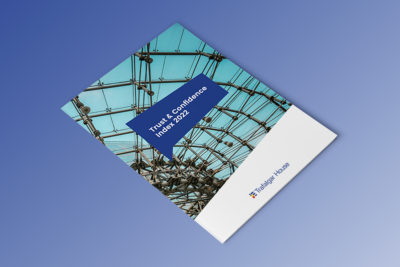Unravelling the trust quotient: member insights on trust and confidence in the pensions industry
A fascinating look into the reasons why members trust (or don't trust) the pensions industry.


Unravelling the trust quotient: member insights on trust and confidence in the pensions industry
Trafalgar House has always believed in the value of deep insights and research. Over the past three years, we have undertaken a comprehensive study of trust and confidence in the pensions industry. Our research, involving over 2,100 participants in 2022, has not only identified areas of high and low confidence, but also delved into why members hold certain perspectives.
We formulated our analysis around the question: “On a scale of zero to 10, how much do you trust the pensions industry, and why?” This blog post dives into the results of our Trust Score rating and the reasons behind the scores.
The responses were diverse, painting a complex picture of trust and confidence in the pensions industry that covered a wide range of influences. However, most responses fell into five broad categories:
- General trust views
- Personal situations
- Financial complaints
- External factors
- No reason.
General trust views – 643 people (30%)
The General Trust Views section showcases a mix of fundamental perceptions about the industry’s overall trustworthiness, reliability, and regulation. Unfortunately, negative views slightly outstripped the positive ones, indicating a need for the industry to work harder on its image. A point of solace was the belief in adequate regulation of the industry; however, the overarching sentiment underlines the necessity for greater transparency, clarity, and accountability in the pensions industry.
“Seems like companies are always stealing from their employees’ pensions. Plus like any investment they’re at the whim of the markets”
“I don’t think pensions are well enough explained or advised upon, for a healthy retirement you need to fork out for a financial advisor”
“I think it’s a relatively trustworthy industry although a lot to understand and navigate through to make informed choices”
“I have to be trusting of such long-term investments, that they will provide me with an adequate retirement. They are also regulated”
“At each review you are provided with a projection which I have found out since I took my pension are fiction and bear no relevance to the pension paid out! I personally think that pensions are a con!”
Personal situation – 541 people (26%)
The Personal Situation category brings forth individual experiences and opinions about people’s personal savings and retirement plans. It’s clear from the responses that a significant proportion of people feel they do not know enough about pensions, or how much they will need for their retirement. The equal split between good and bad personal experiences highlights the inconsistencies in service quality across the industry, which suggests an opportunity to enhance member education and improve customer experience.
Some example and typical views include:
“The pension providers I have been in contact with have been excellent”
“I have received honest advice from pension representatives in the past and been given accurate information on the performance of pension products”
“My overall understanding of pensions is quite low and so I feel I’m putting my trust wholly in third parties without really having great assurance”
“Pensions are too confusing for many people, and this lack of knowledge makes people open to fraud. It is very hard to know who to trust to give the best advice”
“I’m never sure if my money will be safe/worth anything by the time I retire – and whether I’ll live long enough to benefit”
Financial complaints – 215 people (10%)
Financial Complaints are primarily centred around negative views of the financial sector as a whole, with a perception of the industry and being excessively profit-oriented. Concerns about high fees and ethical issues relating to investments also suggest a desire for greater fairness and transparency in the industry’s practices. This points to a need for clearer communication about fees and more socially responsible investing options being available.
Example views include:
“They are controlled by financial institutions whose sole aim in life is to make money for their shareholders and the pension receivers take second place”
“I am not convinced that the pension fund will not invest in fossil fuels, animal testing or environmental destruction/ human rights abuses. I also don’t trust pension funds not to take care of my fund in a financial crisis”
“I know people who have lost lots of money via pension schemes. I feel that there is not enough information provided to people about pensions, particularly young people (at school etc.) I also worry about pension investments linked/not linked to inflation”
External factors – 444 people (21%)
External Factors demonstrate the impact of wider economic and political circumstances on members’ trust. Financial market uncertainty, government policies, and media coverage significantly influence trust levels. While these factors might be beyond the direct control of the industry, they underline the importance of resilience, adaptability, and clear communication during volatile periods.
Some example views include:
“There seems to be a lot of bad press about pension providers. It just makes me nervous”
“Due to stories in the news, I am not very positive about private pensions”
“Too much turbulence in the market, talk of pension deficits, have had family members who have lost their pensions through work funds collapsing”
“So many horror stories and the markets are so volatile”
No reason or unknown – 270 people (13%)
This category includes members who either didn’t provide a reason or were unsure about their ratings. This lack of clarity often links back to a lack of knowledge or connection with their pension scheme and their personal savings. This underscores the need for better member education and communication to help these individuals understand and engage with their pensions more effectively.
In summary
In summary, to build trust and confidence, the pensions industry needs to improve its service by addressing these key areas: enhancing transparency, improving member education, communicating clearly about fees and investment strategies, and increasing resilience and adaptability during periods of external volatility.
Improving service throughout the industry comes from digging deeper below headline scores, and asking members for answers as to why they feel the way they do about pensions and their own retirement plans.
While there are always elements beyond our control, such as attitudes towards the government, economy or people’s personal accountability towards their own savings and engagement decisions, there is still plenty that can be done to win people round through effective and engaging service.


